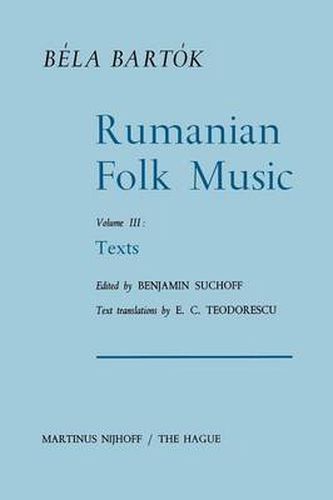Readings Newsletter
Become a Readings Member to make your shopping experience even easier.
Sign in or sign up for free!
You’re not far away from qualifying for FREE standard shipping within Australia
You’ve qualified for FREE standard shipping within Australia
The cart is loading…






This title is printed to order. This book may have been self-published. If so, we cannot guarantee the quality of the content. In the main most books will have gone through the editing process however some may not. We therefore suggest that you be aware of this before ordering this book. If in doubt check either the author or publisher’s details as we are unable to accept any returns unless they are faulty. Please contact us if you have any questions.
N January 30, 1944, Bela Bart6k, writing from Asheville, North O Carolina, where he had gone to regain his strength after a long period of ill-health in 1943, commented, Here I have started on a very interesting (and, as usual, lengthy) work, the kind I have never done before. Properly speaking, it is not a musical work: I am arranging and writing out fair copies of Rumanian folksong texts’! Although the date has not as yet been established, the first draft of the Rumanian folk texts as texts per se was written-if an apparent age of the MS. can be considered a clue-sometime before Bartok had emigrated to the United States in 1940. This draft (see description below) had been forwarded for etymological data, according to the non-Bart6kian autography appearing thereon. The identity of the informant or informants involved and the circumstances surrounding this matter remain unknown at the present writing. After Bart6k had made offset prints of the music examples of the 2 first two volumes of Rumanian F olk Music in 1940, the printed but incomplete draft of Vol. II (Vocal Melodies)-comprising 304 of the ultimate total of 659 pages-was sent to Nicholas Vama~escu, then di rector of The Romanian Radio Hour (Station W. ]. L. B. , Detroit, 3 Michigan), for correction of the texts, in April, 1941. 1 Letter to Joseph Szigeti, in Bartok Bela levelei (ed. Janos Demeny; Budapest: Miivelt Nep Konyvkiado, 1951), p. 184.
$9.00 standard shipping within Australia
FREE standard shipping within Australia for orders over $100.00
Express & International shipping calculated at checkout
This title is printed to order. This book may have been self-published. If so, we cannot guarantee the quality of the content. In the main most books will have gone through the editing process however some may not. We therefore suggest that you be aware of this before ordering this book. If in doubt check either the author or publisher’s details as we are unable to accept any returns unless they are faulty. Please contact us if you have any questions.
N January 30, 1944, Bela Bart6k, writing from Asheville, North O Carolina, where he had gone to regain his strength after a long period of ill-health in 1943, commented, Here I have started on a very interesting (and, as usual, lengthy) work, the kind I have never done before. Properly speaking, it is not a musical work: I am arranging and writing out fair copies of Rumanian folksong texts’! Although the date has not as yet been established, the first draft of the Rumanian folk texts as texts per se was written-if an apparent age of the MS. can be considered a clue-sometime before Bartok had emigrated to the United States in 1940. This draft (see description below) had been forwarded for etymological data, according to the non-Bart6kian autography appearing thereon. The identity of the informant or informants involved and the circumstances surrounding this matter remain unknown at the present writing. After Bart6k had made offset prints of the music examples of the 2 first two volumes of Rumanian F olk Music in 1940, the printed but incomplete draft of Vol. II (Vocal Melodies)-comprising 304 of the ultimate total of 659 pages-was sent to Nicholas Vama~escu, then di rector of The Romanian Radio Hour (Station W. ]. L. B. , Detroit, 3 Michigan), for correction of the texts, in April, 1941. 1 Letter to Joseph Szigeti, in Bartok Bela levelei (ed. Janos Demeny; Budapest: Miivelt Nep Konyvkiado, 1951), p. 184.